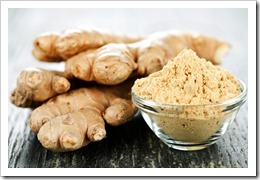Migraine headaches are one of the most common causes of pain and can vary from a minimal impact on activities of daily living to even incapacitating. Numerous over the counter and prescription drugs exist for acute migraine headaches but problems abound with poor satisfaction in many cases and varied side effects in others. In addition, some migraine sufferers have very frequent chronic and recurrent attacks, necessitating the frequent use of some of these acute intervention drugs and thus again, side effects can become an issue. An effective herbal intervention for acute pain relief would be a welcome addition to the list of options.
This double-blind randomized controlled clinical trial compared the efficacy of  ginger to sumatriptan, a standard conventional prescription treatment, in the treatment of common migraine. Study subjects were randomly delivered either one ginger capsule of 250 mg upon onset of headache or 50 mg of sumatriptan. Questionnaires were completed for each headache attack, recording time of headache onset, severity, timing of drug taking and response self-assessments at 30, 60, 90 and 120 minutes and 24 hours. Any adverse effects were also recorded. The overall study duration was one month.
ginger to sumatriptan, a standard conventional prescription treatment, in the treatment of common migraine. Study subjects were randomly delivered either one ginger capsule of 250 mg upon onset of headache or 50 mg of sumatriptan. Questionnaires were completed for each headache attack, recording time of headache onset, severity, timing of drug taking and response self-assessments at 30, 60, 90 and 120 minutes and 24 hours. Any adverse effects were also recorded. The overall study duration was one month.
One hundred sufferers of common migraine headaches, from a Hospital in Iran were the study subjects. The average age of participants was 35.1 in the sumatriptan group and 33.9 in the ginger group. Women comprised 68% of the sumatriptan group vs. 74% of the ginger group. The average duration of a migraine diagnosis was similar in both groups at approximately 7 years. The average number of headache attacks in the sumatriptan groups were 5.8 and 4.9 in the ginger treated group. Inclusion criteria for the study included a confirmed diagnosis of migraine without aura by a neurologist, 18 years and older, high school diploma or higher and a frequency of 2 to 10 headaches/month.
Both sumatriptan and ginger powder decreased the mean severity of common migraine attacks within 2 hours of use. No significant difference existed between the two treatments. Before taking the medication, 22% of the sumatriptan group and 20% of the ginger group had severe headaches. The mean headache severity at 2 hours after sumatriptan or ginger use demonstrated similar effectiveness for both groups. There was 4.7 unit reduction in the headache severity in the sumatriptan group and a 4.6 reduction in the ginger group. Favorable relief was achieved in 70% of the sumatriptan treated headache individuals and 64% of the ginger treated patients at 2 hours following intake. Both the sumatriptan and ginger significantly provided pain relief and no significant differences were achieved.
There were more side effects from sumatriptan using including dizziness, sedation, vertigo and heartburn. The only clinical adverse effect of ginger was dyspepsia.
Commentary: Ginger products have a long tradition of use for joint pain, nausea and vomiting, motion sickness, lipid lowering and a broad range of anti-inflammatory implications. For migraines, a previous study in 2005 demonstrated that ginger completely alleviated migraine headache in 48% of individuals and partially in 34% of individuals within 2 hours. Another study demonstrated that the ginger treated group had a higher pain relief rate at 65% for ginger versus 36% for the placebo.
I am quite impressed that the current study reveals both sumatriptan at 50 mg and ginger powder at 250 mg decreased the mean severity of a common migraine attack and within 2 hours of use. Pain relief and patient satisfaction did not show any significant difference, although side effects due to ginger were far less than those with sumatriptan.
In my experience, the natural medicine strategies for reducing the frequency and severity and duration of migraines are quite effective and include basic lifestyle and nutritional plans, but more robustly involve a multi-factorial approach using riboflavin, ginger, feverfew, 5-HTP, butterbur, magnesium, CoQ10, and sometimes cyclic estrogen patches in women with menstrual migraines. I have never felt very optimistic about acute intervention with these supplements or others in reducing the severity of an acute migraine. I am encouraged by this study, that acute use of ginger capsules for acute migraines may provide pain reduction, with an overall 44% palliation in all headache attacks within 2 hours.
Reference
Maghbooli M, Golipour F, Esfandabadi A, Yousefi M. Comparison between the efficacy of ginger and sumatriptan in the ablative treatment of the common migraine. Phytotherapy Res 2014;28:412-415.

